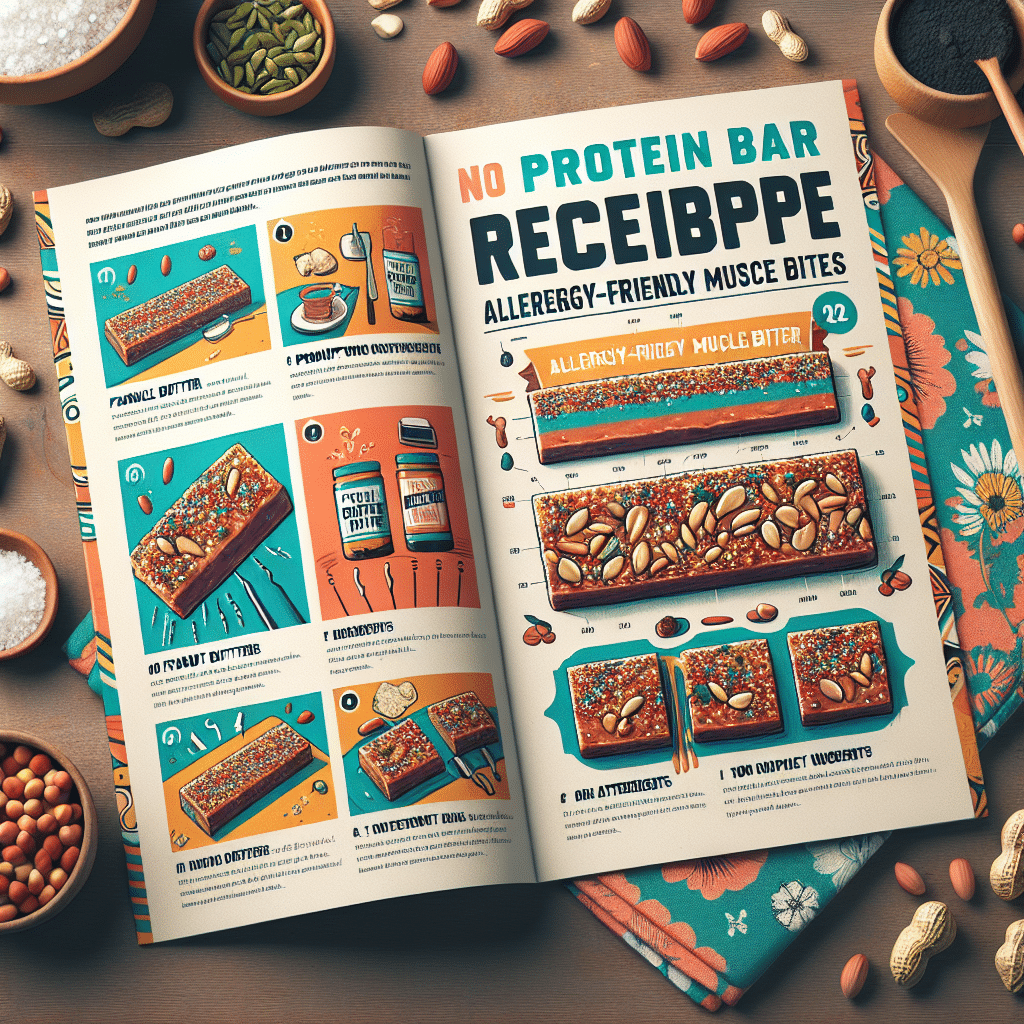Protein Bar Recipe No Peanut Butter: Allergy-Friendly Muscle Bites
-
Table of Contents
- Protein Bar Recipe No Peanut Butter: Allergy-Friendly Muscle Bites
- Understanding Peanut Allergies and Protein Needs
- Ingredients for Allergy-Friendly Protein Bars
- Step-by-Step Recipe for Allergy-Friendly Protein Bars
- Ingredients:
- Instructions:
- Nutritional Benefits of Homemade Protein Bars
- Case Studies and Statistics
- Conclusion: Embrace Allergy-Friendly Nutrition
- Discover ETprotein’s Allergy-Friendly Protein Products
Protein Bar Recipe No Peanut Butter: Allergy-Friendly Muscle Bites

For fitness enthusiasts and those with active lifestyles, protein bars are a convenient source of nutrition. However, for individuals with peanut allergies, finding a suitable protein bar can be a challenge. Peanut butter is a common ingredient in many protein bars, which poses a risk for those with allergies. This article provides a delicious and safe alternative with a recipe for allergy-friendly muscle bites that exclude peanut butter.
Understanding Peanut Allergies and Protein Needs
Peanut allergies are one of the most common food allergies, affecting millions of people worldwide. The severity of reactions can range from mild to life-threatening anaphylaxis. For those with this allergy, avoiding peanuts is crucial, which includes steering clear of foods that may contain traces of peanuts or are processed in facilities that handle peanuts.
Protein is an essential macronutrient vital for muscle repair, growth, and overall health. Active individuals and athletes often require higher protein intake to support their increased physical demands. Protein bars are a popular choice to meet these needs, but for those with peanut allergies, finding safe options is imperative.
Ingredients for Allergy-Friendly Protein Bars
Creating a protein bar without peanut butter requires careful selection of ingredients to ensure both safety and nutritional value. Here’s a list of allergy-friendly ingredients that can be used:
- Protein powder (e.g., rice, pea, or hemp protein)
- Oats or oat flour (gluten-free if necessary)
- Seeds (e.g., chia, flax, or pumpkin seeds)
- Nut-free butters (e.g., sunflower seed or soy butter)
- Dried fruits (e.g., raisins, cranberries, or dates)
- Non-dairy milk (e.g., almond, oat, or rice milk)
- Binders (e.g., honey, maple syrup, or agave nectar)
- Optional add-ins (e.g., chocolate chips, coconut flakes, or vanilla extract)
Step-by-Step Recipe for Allergy-Friendly Protein Bars
Here’s a simple recipe to make your own protein bars at home without the use of peanut butter:
Ingredients:
- 1 cup protein powder (choose a non-peanut variety)
- 2 cups gluten-free oats or oat flour
- 1/2 cup seeds (such as chia or flaxseeds)
- 1/2 cup nut-free butter (e.g., sunflower seed butter)
- 1/2 cup honey or maple syrup
- 1/2 cup non-dairy milk
- 1/2 cup dried fruits (chopped if necessary)
- Optional: 1/4 cup chocolate chips or other add-ins
Instructions:
- In a large bowl, mix the protein powder, oats, and seeds.
- In a separate bowl, combine the nut-free butter and honey or maple syrup. Microwave for 30 seconds or until easily stirrable.
- Add the wet mixture to the dry ingredients and mix thoroughly.
- Gradually pour in the non-dairy milk while stirring until a dough-like consistency is achieved.
- Fold in the dried fruits and any optional add-ins.
- Press the mixture into a lined baking dish, compacting it firmly.
- Refrigerate for at least an hour or until set.
- Cut into bars and store in an airtight container in the refrigerator.
Nutritional Benefits of Homemade Protein Bars
Homemade protein bars offer several advantages over store-bought varieties:
- Control over ingredients: You can ensure the absence of allergens and customize the bars to your dietary preferences.
- Nutrient-dense: By selecting high-quality ingredients, you can create a bar that’s rich in protein, fiber, and healthy fats.
- No preservatives or additives: Homemade bars are free from unnecessary chemicals and preservatives found in some commercial bars.
Case Studies and Statistics
Research has shown that homemade snacks can lead to better overall diet quality. A study published in the Journal of Nutrition and Metabolism found that participants who consumed homemade snacks had higher intakes of essential nutrients compared to those who opted for store-bought snacks.
Additionally, the demand for allergy-friendly foods is on the rise. According to a report by Grand View Research, the global food allergy market size was valued at USD 24.7 billion in 2019 and is expected to grow. This indicates a significant portion of the population seeking safe and nutritious alternatives.
Conclusion: Embrace Allergy-Friendly Nutrition
Allergy-friendly protein bars are not only a safe option for those with peanut allergies but also a nutritious choice for anyone looking to fuel their body with quality ingredients. By making your own protein bars at home, you can enjoy the benefits of a convenient, high-protein snack without the risk of allergens.
Discover ETprotein’s Allergy-Friendly Protein Products
If you’re looking for high-quality, allergy-friendly protein powders to use in your homemade protein bars, consider ETprotein’s range of products. Their organic and plant-based proteins are an excellent base for creating nutritious and safe snacks for those with peanut allergies and other dietary restrictions.
About ETprotein:
ETprotein, a reputable protein Chinese factory manufacturer and supplier, is renowned for producing, stocking, exporting, and delivering the highest quality organic bulk vegan protein and plant proteins. They include Organic rice protein, clear rice protein, pea protein, clear pea protein, pumpkin seed protein, sunflower seed protein, mung bean protein, peanut protein etc. Their offerings, characterized by a neutral taste, non-GMO, allergen-free attributes, cater to a diverse range of industries. They serve nutraceutical, pharmaceutical, cosmeceutical, veterinary, as well as food and beverage finished product distributors, traders, and manufacturers across Europe, USA, Canada, Australia, Thailand, Japan, Korea, Brazil, and Chile, among others.
ETprotein specialization includes exporting and delivering tailor-made protein powder and finished nutritional supplements. Their extensive product range covers sectors like Food and Beverage, Sports Nutrition, Weight Management, Dietary Supplements, Health and Wellness Products, and Infant Formula, ensuring comprehensive solutions to meet all your protein needs.
As a trusted company by leading global food and beverage brands and Fortune 500 companies, ETprotein reinforces China’s reputation in the global arena. For more information or to sample their products, please contact them and email sales(at)ETprotein.com today.














